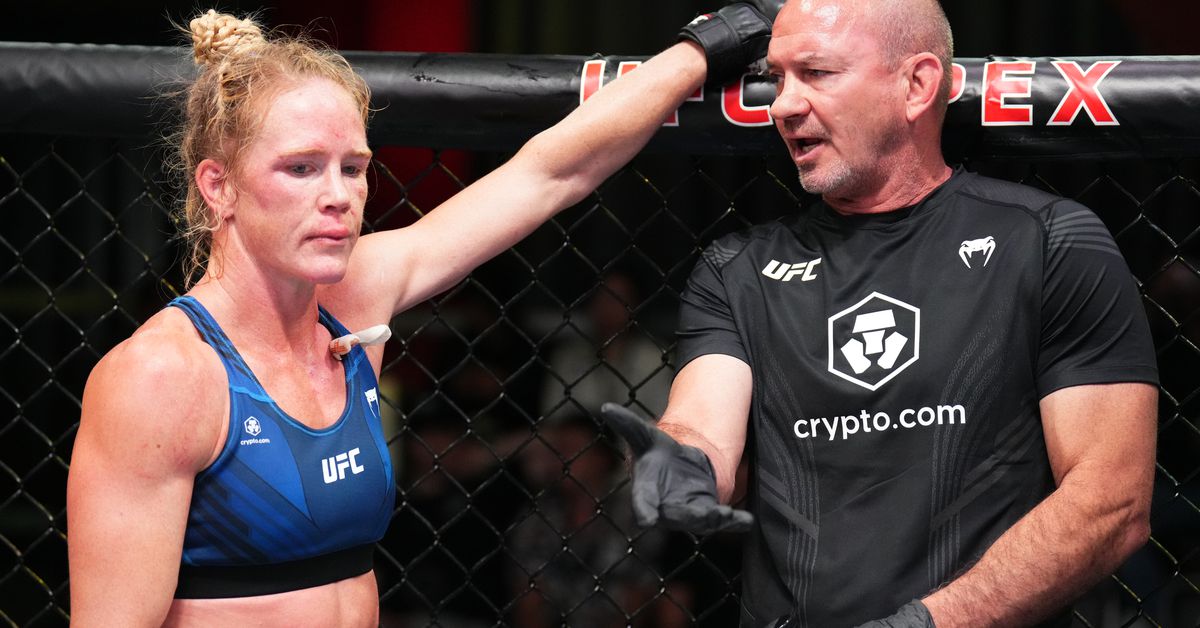Andy Foster is not in favor of open scoring in pro MMA.
This past weekend, UFC Vegas 55 was marred by a controversial decision in the main event, with Ketlen Vieira winning a split decision over Holly Holm in a closely-contested fight. Afterward, the idea of using open scoring was once again raised, but for the executive director of the California State Athletic Commission, that’s not something he’s interested in implementing.
“There’s a lot of reasons why, but I think the biggest reason is you’ll lose the last round a lot of the time,” Foster said on The MMA Hour. “If a fighter knows that they’re up, they’re going to fight defensive, they’re going to fight to win. So if they’re up two rounds, a lot of times they’ll coast that last round. And it’s not me saying it, I can show you videos of it happening, especially in boxing. So I’ve watched that before.
“There’s also this idea that one of the more iconic moments of combat sports, whether it’s boxing or mixed martial arts, especially in a championship fight, is when Bruce or Michael Buffer or Jimmy [Lennon Jr.] says ‘And still,’ or, ‘The new.’ That’s something that’s unique to combat sports, and I wouldn’t want to take that away from it.”
It’s not just the idea that winning fighters will coast to victory, though. For Foster, there is also a serious question of how open scoring would affect the judges themselves, which could fundamentally alter fight outcomes in a negative manner.
“There’s arguments for and against,” Foster said. “I’m not saying I’m not open to trying it, but what I certainly would not want to happen in any shape, form, or fashion, is the judges being able to figure out where the other judges are at in the fight. Whether it’s on purpose or not, you’ll see some balancing of scorecards.
“We love our judges, and they do the best they can, but it’s just human nature to want to be in the majority of all these rounds, and if a judge finds out they’re in the minority, my fear would be — I saw this with boxing before — if it’s a close round, they’re going to balance their scorecard. I don’t want to say that’s every case, but that is a concern. So if we did have open scoring, I would not want the judges to know where we’re at, and I don’t know how you can keep that from happening.
“There are ways, of course, but there’s this idea where you just tell corners and you don’t tell the public, but how is that going to work? The whole idea is to let the public know what the score is, and if the public knows, how are the judges not going to find out? I think there’s ways to solve all this but it’s not just the judging that has to be influenced by this, if we go to open scoring, the referees have to be involved in the discussion also. There has to be more use of the timidity foul. We have to keep the action going if somebody does decide to coast, and that is a departure from where we’re at now, because how many times in the UFC or Bellator have you seen a timidity foul issued in the last 10 years?”
The major argument in favor of adopting open scoring in MMA is that it will allow fighters to know exactly where they stand in regards to winning or losing the fight, and theoretically, to make adjustments to try and win a fight in which they are behind. Furthermore, there is a belief that open scoring will help alleviate controversial decisions, which is an ongoing concern in the sport. For this reason, some MMA organizations have already implemented open scoring, and Foster says he too is willing to give it a shot, at least on the amateur level, even if he doesn’t believe it will be the panacea some believe.
“I’m open to trying,” Foster said. “If it will improve the sport, I’m open to trying anything. I’m not [in favor of it], but I could maybe be persuaded to try it if it turned out to be a good thing, especially with the amateur program. But you mentioned something that I think gets to the heart of this issue, the yellow card — I think in the United States we call that the timidity foul, in some respects. I think that foul is not used enough. I think we need to be implementing that foul. I think if you’re going to criticize judges, there needs to be this idea that the referee gives the judges something to score. If a wrestler is going to use essentially offensive defense, the wet blanket effect, to keep a fighter from being able to fight for five minutes, that’s a hard round to score based on our criteria that’s based on damage…
“I’m open to try, especially in the amateur program. I’ll let you know how it goes. I saw it in boxing. Sometimes it doesn’t affect anything, sometimes I saw it work for the good, but I saw people coast. I have seen that with my own eyes.”


